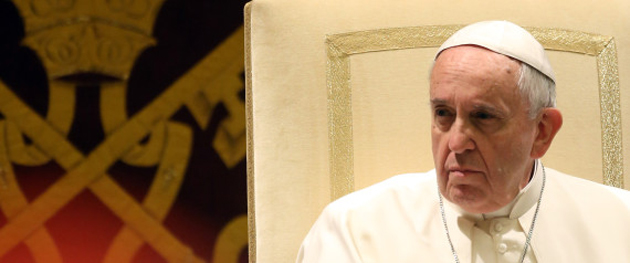Reforming the Curia entails much more than denouncing the poor spiritual conditions of its members or changing personnel in key positions. It involves a radical re-envisioning of the structures of the church according to the supreme apostolic teaching, i.e. the Bible
 Pope Francis last December in the session were he delivered his Christmas greetings to the Curia. / Huffpost
Pope Francis last December in the session were he delivered his Christmas greetings to the Curia. / Huffpost
During the peak of the crisis that preceded the resignation of Benedict XVI in 2013 the Roman Curia was depicted as a “nest of crows”. This central governing body of the Catholic Church, made up of several departments and lead by high ranking officials (the majority being cardinals), had become a place of fierce personal conflicts and internal struggles.
Benedict XVI gave up his pontificate also because he felt unable to find a solution to the chaos that was shedding a sinister light on the Vatican. Pope Francis was chosen “from the end of the world” in the hope that he would deal with the crisis of the Roman Curia as an outsider. Since being elected he has been sending clear signals about his uneasiness towards the Vatican establishment. The latest example of his criticism was his message to the Roman Curia just before Christmas (December 22, 2014) where he diagnosed a spiritually gangrenous reality.
AN IMPRESSIVE LIST OF PLAGUES
The papal analysis of the spiritual condition of the Roman Curia is breathtaking in its denunciation. Here is the devastating list of sicknesses that he identified as he examined its members[1]:
1. The sickness of feeling oneself “immortal,” “immune” or in fact “indispensable”.
2. The sickness of “Martha-ism” (which stems from Martha), of excessive busyness.
3. The sickness of mental and spiritual “petrification”: namely a heart of stone and a “stiff-neck”.
4. The sickness of excessive planning and functionalism.
5. The sickness of bad coordination.
6. The sickness of spiritual Alzheimer’s disease.
7. The sickness of rivalry and vainglory.
8. The sickness of existential schizophrenia.
9. The sickness of gossip, of grumbling and of tittle-tattle.
10. The sickness of divinizing directors.
11. The sickness of indifference to others.
12. The sickness of the mournful face.
13. The sickness of accumulating.
14. The sickness of closed circles.
15. And the last one: the sickness of worldly profit, of exhibitionism.
What else can be added to this list? Whoever has ears, let them hear. More than a nest of crows the picture is more like a bunch of highly dysfunctional and egocentric clerics. This is the spiritual condition of the Roman Curia not according to a staunch anti-clerical observer but according to the head himself: the Pope!
THE MISSING SICKNESS
The honesty and courage of Pope Francis in this case is to be commended. The bitter irony of delivering the message on the occasion of the presentation of Christmas greetings when most would only say “nice” things is also noteworthy. One of the immediate follow-ups of the speech was that among the list of the fifteen new cardinals chosen by Francis only one of them belongs to the Curia whereas most of the others come “from the end of the world” like himself.
Another interesting feature of these new cardinals is that some of them are outspokenly in favor of a more “pastoral” and open approach towards admitting to the Eucharist those in “irregular” relationships, as the Pope seems to be. This is another hot topic that the Pope is handling with increasing difficulty and that will be a test-case of the stability of his pontificate this year.
Back to the list of sicknesses. One consideration is worth mentioning. Historically the Roman Curia is a child of the Renaissance courts that surrounded the princes in their various tasks as absolute monarchs. The Pope as a Renaissance prince also had his dignitaries assigned to him and Popes even today continue to have them in the Vatican state.
Throughout the centuries the Curia was given a theological status as if it were a small model of the Church itself; indeed the Church at its best on a small scale. The Curia is a product of a monarchial vision of the church and the role of the Pope as absolute monarch of a state is also part of the same breed. Pope Francis criticized the awful spirituality of the Curia, but did not go so far as to question its political and monarchial nature. While denouncing its wrong behaviors, he did not tackle the wrong theology behind it. One reason of his reticence is that the Roman Curia as a form of government goes hand in hand with the Papacy as a form of leadership. The two are inseparable. Questioning one means questioning the other and Francis is not prepared to do either.
This means that reforming the Curia entails much more than denouncing the poor spiritual conditions of its members or changing personnel in key positions. It involves a radical re-envisioning of the structures of the church according to the supreme apostolic teaching, i.e. the Bible, where the church has no court of dignitaries nor prince at its head, but Jesus Christ alone, who was crucified, rose again and is now exalted.
At the beginning of his speech to the Curia, Francis quoted 1 Corinthians 12 where Paul speaks of the Church as one body with many members. This is the biblical blueprint of the Church whereby its most serious plagues can be healed and the dignity of the people of God can be restored.
[1] The full speech is here: http://www.zenit.org/en/articles/pope-s-address-to-roman-curia

Las opiniones vertidas por nuestros colaboradores se realizan a nivel personal, pudiendo coincidir o no con la postura de la dirección de Protestante Digital.
Si quieres comentar o